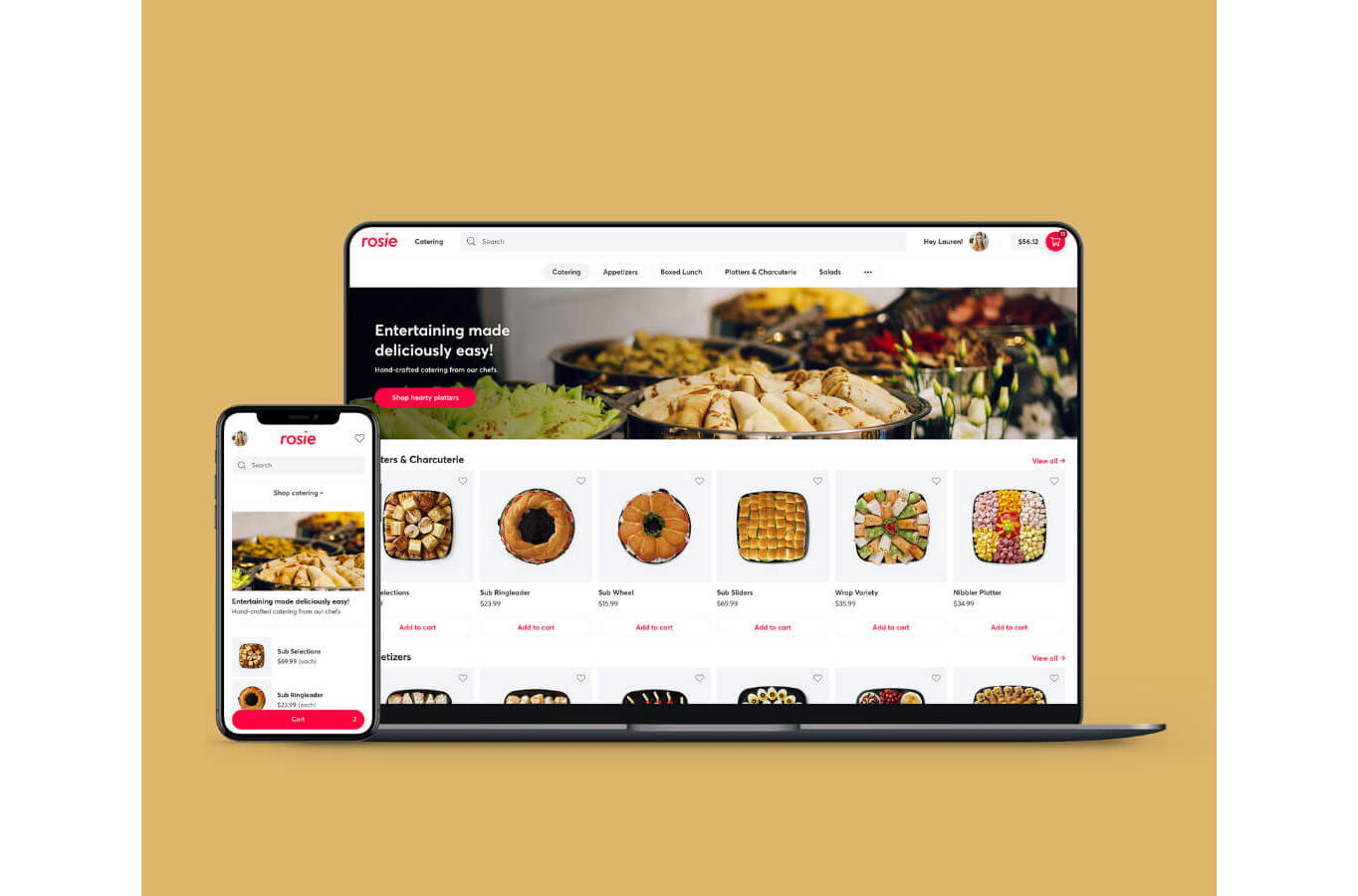New service called Cater debuted before holidays
by Mary Margaret Stewart, staff writer
In 2012, Nick Nickitas founded Rosie, an e-commerce solution for independent retailers and wholesalers. His goal was to “level the playing field,” giving local businesses the tools to compete with national chains and online marketplaces.
“We’ve seen the music industry get completely reshaped as a result of Apple. We’ve seen video rental stores go away because of Netflix. We’ve seen bookstores go away because of Amazon,” said Nickitas, company CEO.

“At some point, you need local retailers to thrive. We feel like the biggest thing that they’ve been missing is technology.”
Over the past eight years, Ithaca, New York-based Rosie has grown to hundreds of retailers, representing thousands of locations in more than 45 states. And much of that growth has happened in 2020 due to the COVID-19 pandemic.
“This year has accelerated the adoption of digital technologies and e-commerce in a huge way,” Nickitas said. “We saw a tremendous expansion in retail adoption, with overall retailer sign-ups increasing 900 percent. As a result, we tripled our team.”
Tripling its team made Rosie one of the fastest-growing companies in upstate New York. Hiring 60-plus people in the past three months has, as Nickitas put it, “been pretty explosive.”
He added that Rosie has witnessed major shifts in terms of who is shopping online for groceries.
Pre-pandemic, the top three segments for e-commerce sales were young families, working professionals and people with mobility issues, such as a visual impairment.
“Since the pandemic, we’ve seen a 2,100-percent increase in shoppers ages 55-plus, so pretty remarkable…that’s been the fastest-growing segment,” Nickitas said.
“From 2019 to 2020, usage by 55- to 64-year-olds grew by 1,252 percent. Usage by 65- to 74-year-olds grew by 2,196 percent. And usage by those 75 and older grew by 1,763 percent. What you’re seeing is not only are people using online shopping more, but new people are using online shopping for the very first time.”
With shifting demographics come shifting priorities, such as larger baskets and a higher demand for products that require more cooking and kitchen prep. But changes aside, Nickitas said the way Rosie approaches the market is with a “simple truth that we really believe in.”
“When products are really well-designed, when they’re easy to use and simple to enjoy, people will invest more time in them,” Nickitas continued. “When something’s high quality like…an Apple laptop…remember that first time you opened your Apple laptop? It’s like magic, right? You open that and for the first time you really want to use it. It encourages you to use it. And you want to spend time figuring out all of the different features and functionalities.
“The same thing is true with software. When software is easy to use and well-designed, shoppers are going to spend more time on it. What we’ve done…we really try to make it well-designed and easy to use. And that’s allowed us to have greater uptick in success with shoppers. It’s not just if you build it, they will come. You’ve got to build it great.”
Rosie is built to be highly customizable, allowing for online shopping to mirror that of an in-person experience – “dynamic and variable, not static and the same,” said Nickitas.
“We’re using some of the same techniques that Twitter, Facebook and the news use, which is having a site…that the retailer can easily update. And that’s what draws shoppers in and makes them coming back for more.”
And the e-commerce solution recently released a new service, Cater, allowing retailers to offer their prepared and more customizable foods, such as cakes, online. Cater couldn’t have come at a better time, too.
“One of the biggest things that shoppers are trying to figure out right now is how to make the holidays a little bit more normal for them and their families. In particular, with everything going on with COVID and lockdowns, people are looking for some help – some different variability around the house,” Nickitas said.
“Cater allows stores to take some of the products that they’re most well-known for – their prepared foods, their catering items, their signature sandwiches, soups and salads – and make those available to their shoppers, just like a Grubhub or Seamless or an Uber Eats.
“Any retailer that’s doing prepared foods, catering, any ‘grocerants’ – these are parts of the store that are some of the highest margin and most differentiated products. These are the reasons that people come in.
“They come in to a local independent for the tarragon chicken salad, not the Cheerios. Any retailer that’s doing interesting things around the perimeter with their prepared foods is a great candidate for Cater.”
And Nickitas said the company has seen tremendous uptake with Cater. Many retailers signed on within the first few days, with Rosie fulfilling several orders for the service by the time Thanksgiving arrived.
“I would say Thanksgiving was a really interesting shift in behavior,” he said. “You were seeing smaller gatherings, with shoppers being more willing to do takeout or get prepared food items – not necessarily put them all together themselves. And I think it’s a big shift from where Thanksgiving has been traditionally for a lot of households.
“As we head toward Christmas, I think a lot of what stores should be thinking about is, how do you create meal solutions and holiday-prepared packages and specials to help households solve the problem – what are we going to have for Christmas this year?
“There’s a lot of opportunities where the store can provide – they can be more than just a purveyor of ingredients. They can be part of creating an incredible experience for families.”
To learn more about Ithaca, New York-based Rosie, click here.

